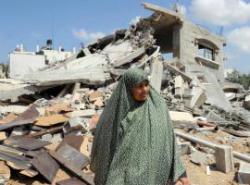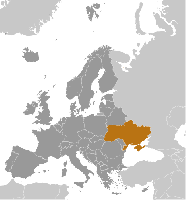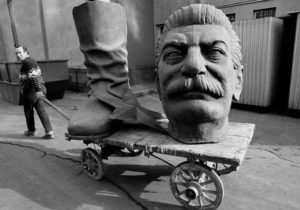 There is so much wrong with Michael Walzer’s brief essay on the New Republic website, supporting Israel in its latest onslaught, while criticizing “a little uneasily” some of the excessive civilian deaths, that it is hard to know where to begin.
There is so much wrong with Michael Walzer’s brief essay on the New Republic website, supporting Israel in its latest onslaught, while criticizing “a little uneasily” some of the excessive civilian deaths, that it is hard to know where to begin.
Michael Walzer's Defense of Israel's Crimes
Ukraine Between a Rock and a Hard Place
The governments of the United States and Russia are attempting to shape events in Ukraine in their own interests, not for the benefit of the Ukrainian people. Ukrainians have long suffered from domination by Moscow, under the Russian czars and later in the Soviet Union, most horrifically under Stalin. With the end of Communism in the Soviet Union and Eastern Europe, millions hoped for freedom and a new beginning.
The Crisis in Ukraine
 The crisis in Ukraine has raised grave problems for the people of that country, significant dangers for world peace, and many contending views on the left. Here we offer three articles that we think help us make sense of what’s going on, by Joanne Landy, Kevin B. Anderson, and Sean Larson.
The crisis in Ukraine has raised grave problems for the people of that country, significant dangers for world peace, and many contending views on the left. Here we offer three articles that we think help us make sense of what’s going on, by Joanne Landy, Kevin B. Anderson, and Sean Larson.
Selective Skepticism
Skepticism is always warranted in the face of government claims, but some folks seem unable to apply the same level of skepticism to claims by Syria's dictator as they do to those of the U.S. government. This will not help us in waging a sustained effective campaign against U.S. military action against Syria; to rest our case on acceptance of Assad's claims weakens our argument. We need to explain why a U.S.-led war on Syria is not the solution, whether or not Assad is responsible for the horrific chemical weapons attack in the Ghouta suburbs of Damascus.
Roundtable on the Syrian Crisis
The Campaign for Peace and Democracy has posted an interesting symposium on Syria. It was mostly written before the August 21 chemical weapons attack and the resulting war threat from Washington. None of the symposium participants favors U.S. military action, but the symposium provides useful background on the Syrian uprising that helps us make sense of the current situation.
Drone Dread

I admire Medea Benjamin, co-founder of the activist group CODE PINK, which has staged anti-war protests and promoted victims’ rights all over the world. Her recently published book, Drone Warfare: Killing by Remote Control, focuses specifically on the relatively new phenomenon in military history of weaponized unmanned aerial vehicles or UAVs, the most common of which is the Predator drone. Having conducted a thorough—and dangerous—fact-finding mission to learn how U.S.
Mali: A Neo-Colonial Operation Disguised as an Anti-Terrorist Intervention*

Translated by Dan La Botz
In mid-January of this year France invaded Mali, a former French colony that sits in the middle of what was once the enormous French empire in Africa that stretched from Algeria to the Congo and from the Ivory Coast to the Sudan. The French government argued that its invasion of its former colony was an anti-terrorist and humanitarian intervention to prevent radical Salafist Muslims from taking the capital of Bamako and succeeding in taking control of the country.
On Syria
During the past two years, the Campaign for Peace and Democracy has released official statements in broad support of the Syrian revolution: CPD Salutes Syria’s Courageous Democratic Movement and Message of Condolence and Solidarity from U.S. Peace Activists to the Syrian People. What follows, however, is not an official position but rather a personal statement by CPD’s co-directors about the current situation.
The Road Home: Bosnians’ Return
"When they broke through the front line, up there, we only had 4 or 5 hours to leave the village. We left in a hurry, a bag on our shoulders, to save our lives."
Duško looks up at the hill behind his house. On September 15, 1995, when Vozu´ca in the adjacent valley fell, he abandoned all his belongings and became a refugee. Over two million people, during the war in Bosnia Herzegovina (BiH), from 1992 to 1995, suffered the same fate.
Gaza Quiz
An uneasy cease-fire has been declared ending Israel's attack on Gaza, Operation Pillar of Defense. Take this quiz to see how much you know about the situation.
NY Times Obituary for Michael Wreszin, New Politics contributor
In a surprisingly warm and positive obituary, the New York Times noted the death of Michael Wreszin in August of this year. The obit says of Wrezin’s writings, “His subjects were cosmopolitan, humanist thinkers who saw a growing militarism in American political culture but whose scrupulous habits of mind could make them misfits in the ideological camps they joined.” Mike Wreszin was a frequent contributor to New Politics. We miss him already.
Some Lessons of 1989’s East European Revolutions: Reflections of a U.S. Peace Activist

In the 1980s, the U.S.-based Campaign for Peace and Democracy/East and West was deeply involved in the struggle for "détente from below." CPD/EW collaborated with the European Nuclear Disarmament network to build solidarity and mutual support between, on the one hand, peace groups and progressive trade unionists in the West and, on the other hand, the democratic movements in Eastern Europe and the Soviet Union.
Some Lessons of 1989's East European Revolutions: Reflections of a U.S. Peace Activist
[This article will appear in the forthcoming summer 2012 print issue of New Politics.]